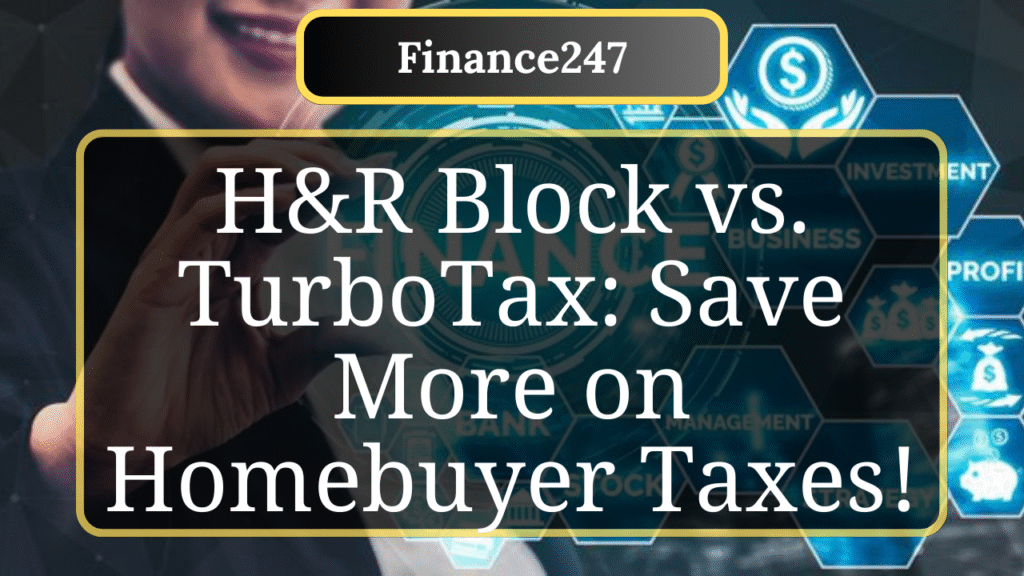“This article compares H&R Block and TurboTax for homebuyers filing taxes, focusing on pricing, usability, and support for mortgage interest and property tax deductions. H&R Block offers lower costs and in-person support, while TurboTax provides a superior user interface and robust integrations. Both handle homebuyer deductions well, but your choice depends on budget and preference for professional assistance.”
Comparing H&R Block and TurboTax for Homebuyer Tax Needs
For homebuyers navigating the complexities of tax season, choosing the right tax preparation software is critical to maximizing deductions like mortgage interest and property taxes. H&R Block and TurboTax are two of the most popular options, each with strengths tailored to different needs. This article compares their features, pricing, ease of use, and support for homebuyers based on the latest available data.
Pricing and Plans
H&R Block offers four DIY e-filing tiers, with its Deluxe plan ($55 for federal, $49 per state) being the most relevant for homebuyers, as it supports itemized deductions, including mortgage interest and property taxes. The Free tier covers simple returns but includes these deductions, making it a cost-effective option for new homeowners with straightforward finances. H&R Block’s state filing is free for simple returns, and additional states cost $37 each. For those needing professional help, H&R Block’s Tax Pro Review and in-person services start at $89, with a vast network of roughly 9,000 physical locations across the U.S. for personalized support.
TurboTax also provides a Free Edition for simple Form 1040 returns, covering mortgage interest and property tax deductions, but it limits filers to one free state return. Its Deluxe plan ($59 for federal, $59 per state) supports similar deductions and is suitable for most homebuyers. For complex situations, the Premier plan ($89 for federal, $59 per state) adds support for investment income, which may apply to some homeowners. TurboTax’s pricing tends to increase closer to the tax deadline, with early-season discounts often reducing costs (e.g., Deluxe dropping to $39 early in the season). Live Assisted plans, which include expert support, range from $99 to $409, depending on complexity.
Ease of Use
TurboTax is renowned for its intuitive, interview-style interface that guides users through tax filing with conversational prompts and clear navigation cues. Its design allows homebuyers to easily input mortgage interest (Form 1098) and property tax data, with embedded explainers and a progress tracker to simplify the process. The platform’s integration with financial institutions enables seamless data imports, reducing manual entry for W-2s or 1099s.
H&R Block’s interface is clean and straightforward, though slightly less conversational than TurboTax. It minimizes manual entry by allowing uploads of W-2s and 1099s, and its design is user-friendly for homebuyers entering mortgage-related deductions. While TurboTax edges out in overall user experience, H&R Block’s simplicity appeals to those who prefer a no-frills approach.
Support for Homebuyer Deductions
Both platforms excel at handling homebuyer-specific deductions, such as mortgage interest, property taxes, and points paid on a home loan, which are typically reported on Schedule A for itemized deductions. H&R Block’s Deluxe and Free tiers support these forms, and its software includes tools to optimize charitable donations and other home-related expenses. TurboTax’s Deluxe and Premier plans offer similar support, with added guidance for depreciation if the home is used for business purposes (e.g., a home office). TurboTax also integrates with tools like ItsDeductible to calculate donation values, which can complement homebuyer deductions.
Customer Support and Professional Help
H&R Block stands out for its robust support options, particularly for homebuyers needing assistance with complex deductions. Its paid plans include unlimited chat or screen-sharing with tax professionals at no extra cost, and its physical offices provide in-person consultations—a unique advantage over TurboTax, which lacks brick-and-mortar locations. However, a final review of your return with H&R Block requires an additional fee for Tax Pro Review.
TurboTax offers extensive support through its Live Assisted tiers, which include real-time chat, phone, or screen-sharing with CPAs or enrolled agents, plus a final review before filing. This comes at a premium, with costs significantly higher than H&R Block’s equivalent services. TurboTax’s free tier has limited human support, requiring an upgrade to PLUS or a paid plan for technical assistance. Both platforms provide guarantees for accuracy, maximum refunds, and audit support, but TurboTax’s audit support is informational unless you purchase its fee-based Audit Defense add-on.
Special Considerations for Homebuyers
For homebuyers with additional income sources, such as investments or rental properties, TurboTax’s Premier plan offers more sophisticated tools, including Coinbase integration for cryptocurrency transactions, which H&R Block lacks. However, H&R Block’s lower pricing and free state filing for simple returns make it more budget-friendly for new homeowners with straightforward taxes. For those valuing in-person support, H&R Block’s physical presence is unmatched.
Choosing the Right Option
H&R Block is ideal for homebuyers seeking affordability and access to in-person tax professionals, especially if their tax situation is relatively simple. TurboTax suits those prioritizing a polished user experience and robust integrations, particularly if they have complex financial portfolios. Both handle homebuyer deductions effectively, but your decision hinges on whether you value cost and physical support (H&R Block) or a seamless digital experience (TurboTax).
Disclaimer: This article is for informational purposes only and does not constitute financial or tax advice. Consult a tax professional for personalized guidance. Information is sourced from reputable websites and industry reports, but prices and features may change. Verify details with providers before filing.

